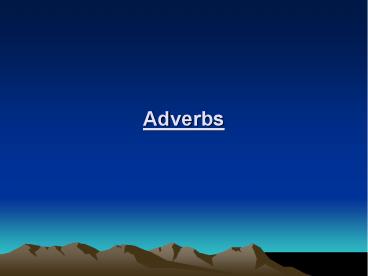Adverbs - PowerPoint PPT Presentation
Title:
Adverbs
Description:
Adverbs Adverbs modify verbs adjectives other adverbs quantifiers and whole sentences They answer the questions How? When? Where? – PowerPoint PPT presentation
Number of Views:687
Avg rating:3.0/5.0
Title: Adverbs
1
Adverbs
2
Adverbs modifyverbsadjectivesother
adverbsquantifiersandwhole sentences
3
They answer the questionsHow?When?Where
?How often?How sure?
4
Adverbs that modify verbs can go in several
different places in a sentence.At the
beginningAt the endAfter the helping verb
5
Adverbs that modify adjectives and other
adverbs go directly before the words they
modify.She is always late.
6
Add ly to adjectives to form many
adverbs.Quick quicklycareful
carefullynice nicelyeasy - easily
7
Children learn new languages easily.He
speaks English very well.
8
Many adverbs do not end in ly.
- Fast
- Here
- Late
- Often
- Now
- There
- Sometimes
- Today
- Upstairs
- Downstairs
- Very
- Well
- Yesterday
- Inside
- Outside
- Always
9
Adverbs of timeadverbs of manneradverbs
of frequencyadverbs of possibility
10
Adverbs of manner tell how something
happens.Fast, slowlywell, badlycarefullypatie
ntlyright
11
Position of adverbs of manner
- After the main verb when there is no object.
- After the verb object
12
I speak slowly.I read the article slowly
13
Many adverbs of manner are formed from
adjectives lyAdjectives that end in y drop
the -y and add ilyAdjectives that end in ic
or ical add -ally
14
Irregular forms of adverbs and adjectives
- Fast
- Hard
- Right
- Wrong
- Loud
- Long
- Friendly, lively, lovely, lonely
- Good, well
15
Adverbs of place tell where something is
or where it happens. (location). They also
express where something or someone is going
(direction).Here, there, up, down, in, out,
inside, together, back, away
16
Position of adverb of place
- After the main verb when there is no object, or
after verb object - Direction adverbs always come after a pronoun
object
17
We left her here.We took the children
backWe gave back the money.We took it back.
18
Adverbs of time tell when something
happens. Yesterday, tomorrow, afterwards, now,
early, late, then
19
Position of adverbs of time.
- At the beginning or at the end of the clause
- Early and late go at the end
20
Yesterday, I took the children to the
movies.I took the children to the movies
yesterday.I went home early.She came late.
21
Adverbs of frequency tell how often
something happensalways, usually,
often,sometimes,seldom, never
22
Position of adverbs of frequency
- After the subject and be.
- Before other main verbs
23
She is always hungry.She always comes
late.
24
Adverbs of possibility tell how sure we
are about somethingcertainly, definitely,
probably, perhaps, maybe, possibly
25
Position of adverbs of possibility
- Perhaps and maybe are at the beginning of the
sentence - The others go after the subject and be but before
other main verbs
26
Perhaps we should eat in the cafeteria
today. I certainly want you in the next class.
27
Adverbs of degree make the word they
modify stronger or weaker.Extremely, too, very,
so, really, quite, enough, almost, hardly
28
Position of adverbs of degree
- Before the word they modify
- Enough comes after the word it modifies
29
They are also called intensifiers. They
modify verbs, adjectives, other adverbs and
quantifiers.
30
You work too hard.I dont eat very
much.You almost failed the exam.You dont
sleep enoughShe doesnt try hard enough.
31
Hard and HardlyHe works hard.He is a
hard worker.He hardly works.
32
Enough (quantifier)I have enough money to
live comfortably.It comes before the noun
Enough (intensifier)You arent eating enough.
It comes after the noun it modifies.
33
SoandSuchShe is so nice.She is such a
nice girl.
34
The end!































